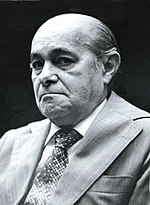Tancredo Neves, Date of Birth, Place of Birth, Date of Death
TweetTancredo Neves
Brazilian politicianAbout Tancredo Neves
- Tancredo de Almeida Neves SFO (Portuguese pronunciation: [t?~'k?edu d?i aw'mejd? 'n?vis]) (March 4, 1910 – April 21, 1985) was a Brazilian politician, lawyer, and entrepreneur.
- He served as Minister of Justice and Interior Affairs from 1953 to 1954, Prime Minister from 1961 to 1962, Minister of Finance in 1962, and as Governor of Minas Gerais from 1983 to 1984.
- He was elected President of Brazil in 1985, but died before he took office. He began his political career with the Progressistas (PP) of Minas Gerais, for whom he served as city councilman of São João del Rei from 1935 to 1937.
- He received the majority of votes and became President of the Municipal Legislature.
- He was elected state representative (1947–1950) and congressman (1951–1953) as a member of the Social Democratic Party (PSD).
- He took office in June 1953, acting as Minister of Justice and Minister of Internal Affairs until the suicide of President Getúlio Vargas.In 1954 Neves was elected congressman and served for one year.
- From 1956 to 1958 he was director of Banco de Crédito Real de Minas Gerais and President of Carteira de Redescontos of Banco do Brasil from 1956 to 1958.
- From 1958 to 1960 he headed the Department of Finance of Minas Gerais.
- Neves was nominated Prime Minister of Brazil after President Jânio Quadros resigned and the introduction of the Parliamentary Regime in 1961 and was re-elected congressman in 1963. He was a leader of the Brazilian Democratic Movement (MDB), a political party created on October 27, 1965 through the Institutional Act Number Two (AI-2) which abolished all existing parties and the institution of bi-partisanship.
- He was later re-elected congressman several times between 1963 and 1979.
- After the re-institution of a multiparty system Neves became a senator as a member of the MDB in 1978 and founded the Popular Party (PP) with which he continued to serve until 1982.
- He joined the Brazilian Democratic Movement Party (PMDB) the following year and was elected governor of Minas Gerais where he served from 1983 to 1984.
- During this period, there was great political turmoil in favour of the movement known as Diretas Já, a civil action that mobilized the youth and proclaimed direct elections for president.
- But with the defeat of the "Dante de Oliveira amendment", mandated direct elections for president in 1984.
- Neves was chosen to represent the Democratic Alliance, a coalition of opposition parties. In 1984, Neves ran for president with the help of Ulysses Guimarães.
- He was elected President of Brazil on January 15, 1985 by the indirect voting of an electoral college.
- Neves fell gravely ill on the eve of his inauguration, March 14, 1985, and died 39 days afterwards.
- He died of diverticulitis and never assumed his position as president.
- While still ill, he was awarded the Grand Cross of Value, Loyalty and Merit by the Military Order of the Tower and Spade on March 27.
- Although he died before taking his post as president his name has been included in the gallery of Brazilian presidents according to law 7.4653, passed on the first anniversary of his death.
- Neves was the last Mineiro (from the State of Minas Gerais) President to be elected in the 20th century (before Dilma Rousseff in 2010). Neves was one of the most important Brazilian politicians in the 20th century and one of the major statesmen of Brazilian history.
- In July 2012 he was elected one of the 100 Greatest Brazilians of All Time in a competition organized by Sistema Brasileiro de Televisão (SBT) and the British Broadcasting Corporation (BBC).
Read more at Wikipedia
See Also
- Famous People's Birthdays on 04 March, Brazil
- Famous People's Birthdays in March, Brazil
- Famous lawyer's Birthdays on 04 March, Brazil
- Famous lawyer's Birthdays in March, Brazil
- Famous politician's Birthdays on 04 March, Brazil
- Famous politician's Birthdays in March, Brazil
- Famous entrepreneur's Birthdays on 04 March, Brazil
- Famous entrepreneur's Birthdays in March, Brazil


 Date of Birth:
Date of Birth:  Place of Birth: São João del Rei, Minas Gerais, Brazil
Place of Birth: São João del Rei, Minas Gerais, Brazil